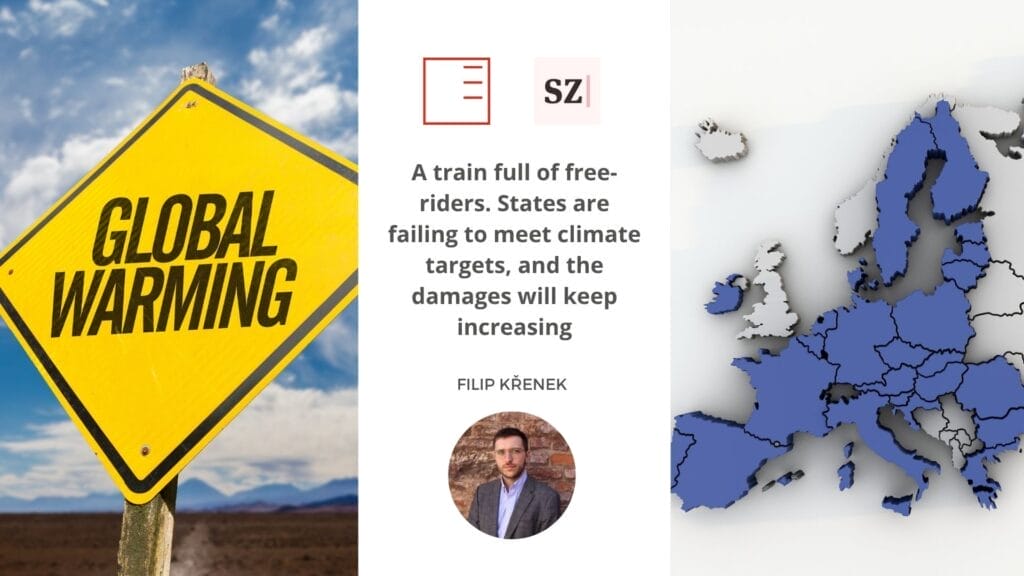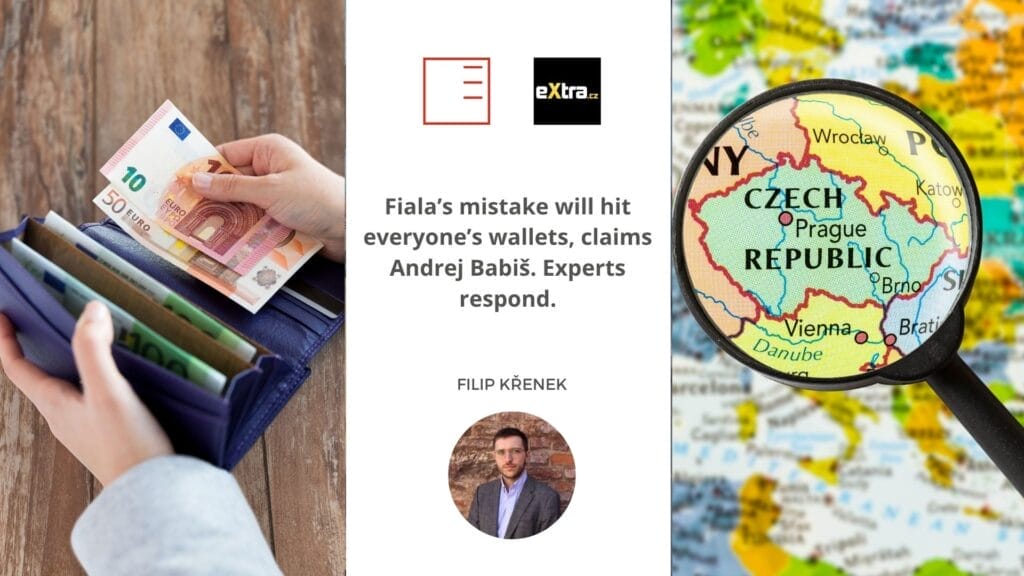
Despite the challenges, the Czech automotive industry is doing well. What awaits it next year?
More info 29. 12. 2025
29. 12. 2025
Despite high energy prices, geopolitical uncertainty, and growing international competition, the Czech automotive industry remains in relatively strong shape. Production levels in 2025 remain high, with Czechia recording one of the strongest year-on-year growth rates in Europe. The sector’s resilience is driven by its flexibility, high factory utilization, and growing success on European markets, particularly in electric vehicles. The article was commented on by Filip Křenek, analyst at the EUROPEUM Institute.

ČT1 | The European Commission has softened its plan to ban the sale of cars with internal combustion engines
More info 16. 12. 2025
16. 12. 2025
The European Commission has softened its original plan to ban the sale of cars with internal combustion engines after 2035. Under the new proposal, CO₂ emissions from new vehicles would have to be reduced by 90 percent compared to 2021 levels, rather than eliminated entirely as initially planned. For ČT1, the situation was commented on by Filip Křenek, an analyst at the EUROPEUM Institute.

iDNES.cz | The German plan will harm Czech industry. Energy-intensive companies are set to take a hit
More info 15. 12. 2025
15. 12. 2025
A kind of “Christmas bonus” awaits German companies: the governing coalition will secure them significantly cheaper electricity. Czech industry, by contrast, will pay at least 30 percent more, which for companies such as Třinecké železárny means cost differences running into billions of crowns compared to their German competitors. For iDNES, the situation was commented on by Filip Křenek, an analyst at the EUROPEUM Institute.

Low-emission materials for the Czech automotive industry
More info 2. 12. 2025
2. 12. 2025
The Low Emission Materials for the Czech Automotive Industry project is the fifth EUROPEUM project aimed at decarbonising the Czech automotive industry. The aim of the project for 2024/2025 is to improve understanding of material flows and regulatory barriers in the automotive sector; to transfer best practices from the international context to the Czech environment; and to identify key areas of Czech and European policies that need to be improved to enable the automotive industry to meet the challenges of decarbonisation and remain competitive.

“From drowning to rescuer”: the secrets of Škoda, Volkswagen’s Czech engine
More info 2. 12. 2025
2. 12. 2025
Škoda Auto has become a key growth engine of the Volkswagen Group, posting strong sales growth and successfully transforming its brand image. Its performance in electric vehicles and its strong position in Europe highlight the company’s strategic importance. The article was commented on by Filip Křenek, analyst at the EUROPEUM Institute.

Seznam Zprávy | A train full of free-riders. States are failing to meet climate targets, and the damages will keep increasing
More info 14. 11. 2025
14. 11. 2025
The world is pouring huge amounts of money into reducing emissions, yet most countries still fail to meet the Paris Agreement, and global warming continues. While some emissions have plateaued, climate-related damages are rising, and the “free-rider” problem persists as states benefit from inaction. Geopolitical factors, especially the shifting climate policies of China and the United States, further complicate progress. For Seznam Zprávy, the article was commented on by Filip Křenek, analyst at the EUROPEUM Institute.

eXtra.cz | Fiala’s mistake will hit everyone’s wallets, claims Andrej Babiš. Experts respond.
More info 10. 11. 2025
10. 11. 2025
EU environment ministers approved new climate targets for 2040 and postponed the ETS2 system by one year. Andrej Babiš criticized the agreement as a failure of the Czech government, warning of higher costs, while experts argue the impact on households remains largely unchanged. Analyst Filip Křenek notes that catastrophic price scenarios are unlikely and that rejecting ETS2 could leave Czechia facing heavy EU penalties and the loss of billions from the Social Climate Fund. Commented for eXtra.cz by Filip Křenek, analyst at the EUROPEUM Institute.

Recommendations of the National Convention on the EU | The Role of the Czech Republic and the Competitiveness of the European Union
More info 10. 11. 2025
10. 11. 2025
The National Convention on the EU published recommendations from a roundtable held on 26 September 2025, which focused on the role of the Czech Republic and the competitiveness of the European Union, including economic security, relations with the USA and China, and the Global Gateway strategy. The discussion addressed the steps the EU should take to strengthen its competitiveness and security, as well as the priorities the Czech Republic should promote in these areas.

Press release | Low-emission Materials for the Czech Automotive Industry
More info 31. 10. 2025
31. 10. 2025
The EUROPEUM Institute for European Policy published a press release on 31 October 2025, presenting an analysis of material flows and recycling in the Czech automotive industry and highlighting the need for collaboration between automakers, steel producers, and recyclers to achieve low-carbon and circular solutions.

Report, Policy Paper | Low-emission materials for the Czech automotive industry
More info 31. 10. 2025
31. 10. 2025
The Czech automotive industry remains one of Europe’s strongest, producing 1.45 million cars in 2024 and accounting for 12.7 percent of EU output, with more than 90 percent destined for export. This high level of integration into European and global supply chains creates both opportunities and vulnerabilities, especially given Czechia’s dependence on imported aluminium, battery materials and automotive-grade steel, and its reliance on German demand and Chinese supply.
Our estimates show that the sector’s material needs already reach around 260 kt of aluminium, 1.4 Mt of steel and 20 GWh of Li-ion batteries per year, and will increase further as electric vehicles approach a 60 percent share of production by 2030. Meeting this demand will require more than rising imports. It will depend on a functioning domestic market for high-quality scrap, progress on battery recycling and strategic investment in low-carbon materials. Upcoming EU regulations, including the ELVR, Battery Regulation, CRMA, CBAM and ESPR, will raise the standards for circularity and secondary material use, but Czechia still lacks a strategy to align with these requirements. Without clearer policy direction and investment in modern recycling and sorting infrastructure, the country risks increasing its reliance on high-carbon imports despite having significant potential to recover valuable materials at home.

EURACTIV.pl | Big Stakes, Big Money: How the EU’s Next Seven-Year Budget Could Shape Poland and Czechia
More info 27. 10. 2025
27. 10. 2025
The European Commission’s proposal for the 2028–2034 Multiannual Financial Framework has sparked lively discussions among EU governments and in the European Parliament. With close to €2 trillion at stake, the key question is how the EU can finance its priorities, repay pandemic-era debt, and support countries such as Poland and Czechia — all while avoiding new political rifts. EUROPEUM analyst Filip Křenek takes a closer look at the issue here.

Euractiv | Proposed new EU budget is promising but raises uncertainity, experts warn
More info 23. 10. 2025
23. 10. 2025
Negotiations on the EU's multiannual budget for 2028-2034 are in full swing. How are Czechia and Poland responding to the proposal? Experts say that both countries appreciate the simplified structure and greater flexibility of the budget, but at the same time express concerns about the system of national plans.